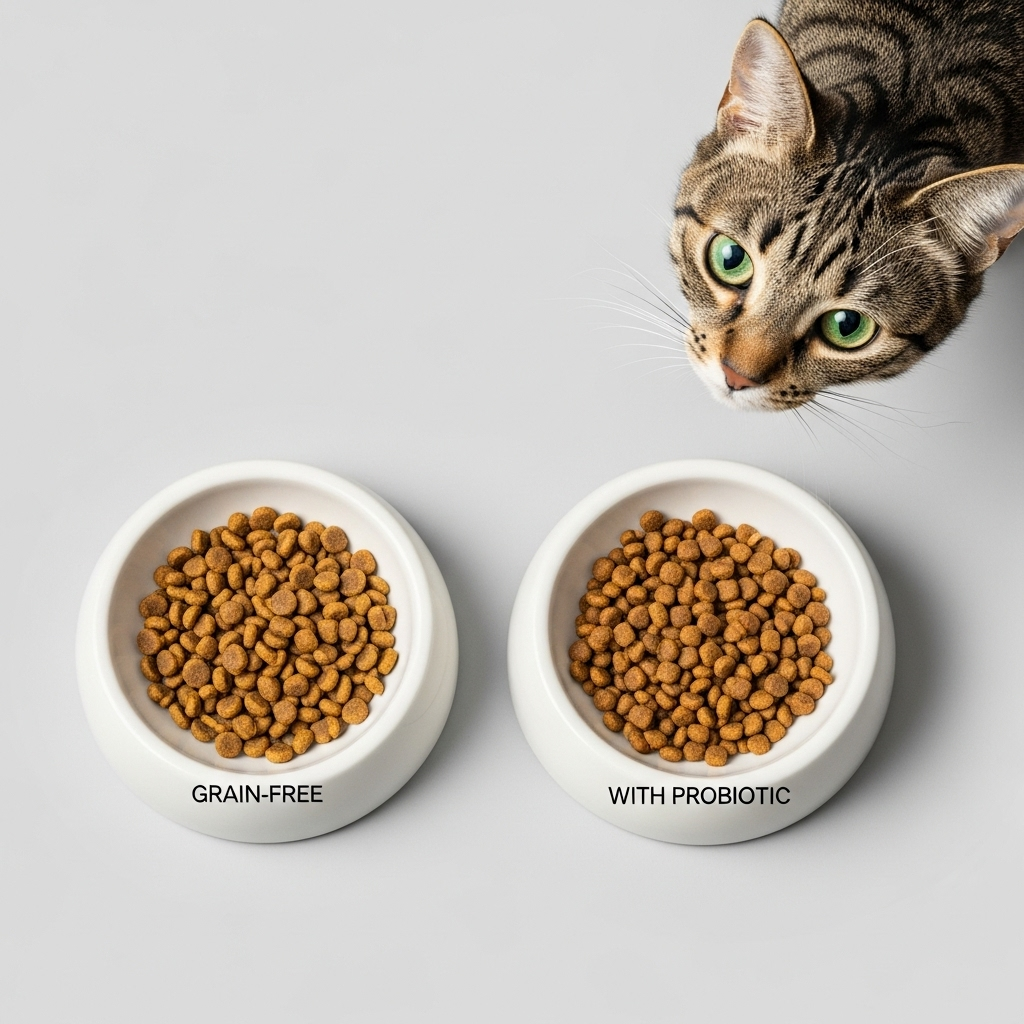Grain-Free Diet Cats: Do They Still Need Probiotics?

Many cat owners choose grain-free diets because they believe these foods are closer to a cat’s natural carnivorous needs or because their cat had digestive sensitivities. But removing grains from a cat’s food doesn’t automatically eliminate the need for probiotics. This article explains why gut health still matters on a grain-free diet, when probiotics can help, how to choose them safely, and what signs mean you should consult your veterinarian.
Why gut health matters in cats
Cats are obligate carnivores with digestive systems adapted for high-protein, low-carbohydrate diets. However, like all mammals, cats have a gut microbiome — a community of bacteria, yeasts, and other microbes that help with digestion, nutrient absorption, and immune function. A balanced microbiome helps maintain healthy stool, reduces inflammation in the gut, and supports overall wellness.
What is a grain-free diet?
“Grain-free” means the food omits common grains such as wheat, corn, and rice. Many grain-free cat foods replace grains with animal-based proteins and sometimes with legumes, potato, or other carbohydrate sources. Grain-free does not automatically equal lower carbohydrate or “better” for every cat; formulation, ingredient quality, and individual cat needs matter.
Do grain-free cats need probiotics?
Short answer: not always, but often probiotics can be helpful. A grain-free diet can affect the gut microbiome, and probiotics may provide benefits in specific situations.
When probiotics may help
- Diet changes or transitions — switching foods (including to grain-free) can cause temporary diarrhea or soft stools; probiotics can ease the transition.
- After antibiotics — antibiotics can disrupt beneficial gut bacteria; probiotics may help restore balance.
- Chronic or recurrent diarrhea — some cats with ongoing GI issues benefit from targeted probiotic therapy under veterinary guidance.
- Stress-related GI upset — travel, boarding, or vet visits can trigger digestive changes; short-term probiotics sometimes reduce symptoms.
- Immune support — a balanced microbiome contributes to mucosal immunity, which can be useful for overall health in some cats.
When probiotics may not be necessary
- A healthy adult cat with normal stool and no GI problems may not need a daily probiotic.
- If the diet is well-balanced and the cat is thriving, adding a probiotic is optional rather than essential.
Types of probiotics for cats
Common probiotic options include live bacterial strains (Lactobacillus, Bifidobacterium, Enterococcus) and yeast-based probiotics (Saccharomyces boulardii). Some feline-specific products contain strains studied in cats. Over-the-counter human probiotics are sometimes used but formulations differ — follow a veterinarian’s advice before using them.
How to choose and use a probiotic
- Choose a product formulated for cats when possible — these account for feline digestive physiology and dosing needs.
- Look for labeled strain names and CFU counts. While numbers vary by product, follow manufacturer and veterinary guidance rather than assuming “higher is always better.”
- Start gradually — introduce a small amount and monitor stool consistency and behavior for 1–2 weeks.
- Follow storage instructions — some probiotics require refrigeration to maintain viability.
- Use probiotics for a defined reason (e.g., transition, antibiotic recovery) and reassess need; lifelong daily use is not always necessary.
Safety and side effects
Most healthy cats tolerate probiotics well. Mild, temporary effects — such as a little gas or looser stool — can occur as the gut adjusts. Probiotics are generally considered safe, but special caution is needed for:
- Immunocompromised cats (e.g., those on heavy immunosuppressants): rare infections from live organisms are possible.
- Critically ill or hospitalized cats: use probiotics only under veterinary supervision.
- Cats with severe, persistent diarrhea or other concerning symptoms: seek veterinary evaluation first.
Pros and Cons
| Pros | Cons |
|---|---|
| Can ease dietary transitions and reduce short-term GI upset | Not all products are equally effective; quality varies |
| May help restore balance after antibiotics | Some cats may experience mild gas or soft stool initially |
| Supports gut-related immune function in some cases | Live products may pose risk for severely immunocompromised animals |
Monitoring and when to contact your veterinarian
After starting a probiotic, watch your cat’s appetite, activity, and stool for 7–14 days. Contact your veterinarian if you see:
- Persistent or worsening diarrhea or vomiting
- Changes in behavior, lethargy, or loss of appetite
- Signs of dehydration or blood in the stool
FAQ
1. If my cat eats a grain-free diet, does that mean their gut is healthier and probiotics are unnecessary?
Not necessarily. Diet influences the microbiome, but grain-free formulation alone doesn’t guarantee a balanced gut. Probiotics may still help during transitions, stress, or after antibiotics.
2. Can I give my cat human probiotic supplements?
Some human probiotics are safe, but formulations and dosages differ. It’s best to consult your veterinarian before using a human product so you use an appropriate strain and dose.
3. How long should I give a probiotic to my cat?
For short-term needs (diet change, antibiotics), a few days to a few weeks is common. For chronic issues, your vet may recommend a longer course or specific product. Reassess need periodically with your veterinarian.
4. Are prebiotics useful with a grain-free diet?
Prebiotics (fibers that feed beneficial bacteria) can be helpful, but cats tolerate fiber differently than other species. Some prebiotics are included in pet formulas, but use them under veterinary guidance if your cat has sensitive digestion.
5. What if my cat gets worse after starting a probiotic?
Stop the supplement and contact your veterinarian. Temporary mild changes can occur, but worsening symptoms should be evaluated promptly.
Key Takeaways
- Grain-free diets do not automatically remove the need for probiotics; gut health depends on multiple factors.
- Probiotics can help during diet changes, after antibiotics, and for some cases of diarrhea or stress.
- Choose cat-specific products when possible, start slowly, and follow storage and dosing instructions.
- Most healthy cats tolerate probiotics well, but consult your veterinarian for kittens, elderly, sick, or immunocompromised cats.
- Monitor your cat and seek veterinary care if symptoms worsen or do not improve.
Disclaimer: This article provides general information about probiotics for cats and is not a substitute for veterinary advice. Always consult your veterinarian before starting any new supplement, especially for kittens, pregnant or nursing cats, cats on medication, or those with medical conditions.

Leave a Reply